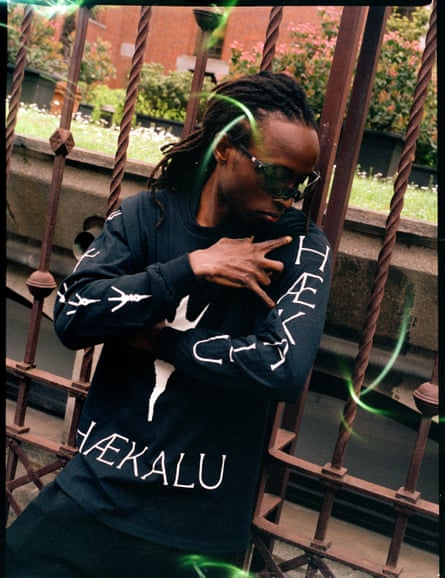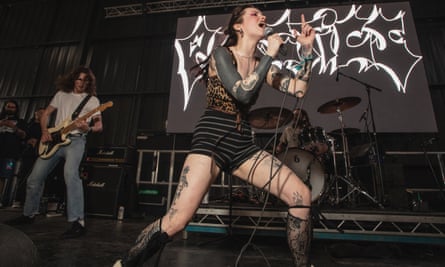As a teenager, Martin Kanja spent countless late nights listening to heavy metal on a local radio show. The furious riffs, shrieks, growls and distorted sounds drowned out his angst. “What drew me to the music was how it was so ‘physical’ – very present, very now – there was no space for negative thoughts or feelings,” says Kanja, who soon decided he too wanted to be a metal artist.
In 2010, when he was 19, he left his home town in Kenya’s midwestern city Nakuru for the capital, Nairobi, figuring it was his best bet for a foothold in the underground scene.
Fourteen years on, Kanja, AKA Lord Spikeheart, is a veteran of African metal, redefining the boundaries of the genre with the experimental sounds of his debut solo album, The Adept. The album, released in April through his new label, Haekalu – the first in Africa dedicated exclusively to the darkest and heaviest music genres – is a tribute to his great-grandmother Muthoni wa Kirima, the only female field marshal in the Mau Mau anti-colonial uprising, who died last year.
Kanja, 33, says he wanted “to honour her legacy and what she did for the country, and to appreciate all the struggles [the Mau Mau] went through in the fight for independence, so that their names can never be forgotten”.
Political themes run through the album. Using heavily distorted lyrics and sounds, from muffled screams to high-pitched squealing, Kanja expresses anger over the everyday oppression he sees across the continent, such as land inequalities originating from the British colonial era, China’s debt-trap diplomacy, and exploitative resource extraction.
Researchers trace African metal back to the 1970s, but in many countries on the continent, it remains on the periphery because of its perceived associations with satanism, aggression and drug use.
“Metal has always been a minority in the world – people just hear the growls or the screams and they are scared of them, but for me the lyrics and sounds are like poetry or literature, addressing real issues you can relate to,” says Kanja. Behind the heavy and aggressive sounds of his music lie messages about empowerment, self-actualisation and social consciousness.
Until recently, Kanja performed as part of the band Duma (“darkness” in his native language Kikuyu), which he formed with the Kenyan guitarist and producer Sam Karugu in 2019. The duo gained international traction for their manic industrial metal that disregarded traditional rules of the genre, touring cities in the US and Europe.

Kanja’s new album borrows from that chapter, challenging the boundaries of metal through collaborations with artists in different genres such as trap, hip-hop and noise, particularly those experimenting in their own fields, including the American rapper Fatboi Sharif and the Japanese producer Saionji BBBBBBB. His songs, which are in English, Swahili and Kikuyu, are infused with traditional African instruments and sounds.
“These are the sounds I grew up with,” says Kanja. “Since Africa has not been well represented on the global metal scene, it’s time to offer something different, fresh and captivating.”
Kanja was raised in a Christian home. His mother, a government worker and devout church leader, wanted him to go into the ministry, while his father, also a civil servant, didn’t see music as holding much promise. But Kanja’s affinity with music was apparent from early on in his childhood, when he would hold make-believe concerts with his siblings in the family living room, singing along to their favourite tunes on the radio. As an extrovert with a cheery disposition and a love of the outdoors, he didn’t fit stereotypical ideas of a metalhead.
after newsletter promotion
“People think [metal] is just for emo or gothic kids, but it’s the opposite,” says Kanja, who found a diverse and close-knit circle of friends in Nairobi’s small but active underground metal community.
Kanja formed his first band, Lust of a Dying Breed, after arriving in Nairobi as a teenager. It went on hiatus shortly after they released their first record in 2012, as the band struggled to make a living from music. He took a series of jobs, working at a security company, then later in gold mining, farming and the family’s tourism business. But it was not long before he began writing again and started to play with other artists in makeshift studios and friends’ basements as part of another band, The Seeds of Datura.
In 2017 he decided to pursue music permanently, and grew out dreadlocks that he vowed not to cut, believing they would deter employers from hiring him if he was ever tempted to go back. His friends nicknamed him Spikeheart because of his spiky locs. As a solo act, he has performed at events including the Venice Biennale, the Roskilde music festival in Denmark, and the Roadburn festival in the Netherlands.
Making inroads into the global metal scene is not easy, says Kanja. African artists face many barriers making, producing and marketing music on the continent, such as access to instruments and record deals. There are also fewer audiences, venues and promoters for metal in the region.
“I’ve seen artists being taken advantage of because they don’t have the information or resources, so they just go for these really bad deals that don’t help them in the long run,” says Kanja, who attributes his burgeoning career to the support from other artists in the metal community.
“I wouldn’t be here if it wasn’t for them,” says Kanja, who hopes to help other African artists get their music out there through his Haekalu (“temple” in Swahili) label, which is based in the the Ugandan capital, Kampala, where he now lives. “Many artists in my scene don’t have the resources or tools to navigate the music business side of things, and it’s easy to get stuck. So having a homegrown label that can help artists push their music further than they thought it could go is very important for the [regional metal] scene”.
Source: theguardian.com





















